Santa Clara Valley Chapter (SCV) Report
The IEEE Circuits and Systems society (CASS) Santa Clara Valley (SCV) Chapter held its first lecture event of 2019 on January 31st. The speaker for the event was Dr. Ratnesh Kumar who is currently a Deep Learning Architect at nVidia Inc. USA. The lecture titled "Vehicle Re-identification for Smart Cities: A New Baseline Using Triplet Embedding" gave the audience an insight into a very complex visual computing scenario involving surveillance cameras that are being proliferated in major cities in order to make them smart and safe. Typical challenges arising in smart city scenarios include variations of viewpoints, illumination and self occlusions. The lecture focused on exhaustive evaluation of deep embedding losses applied to vehicle re-identification and demonstrated how deep learning-embedding outperforms prior art. The lecture was held at Cypress Semiconductor Crop. north San Jose campus and was broadcast live on Zoom. The total attendance was 15.
On February 21st, CASS co-sponsored a lecture event with IEEE Solid State Circuits Society (SSCS) local chapter on the topic of “Cryogenic CMOS Interfaces for Large-Scale Quantum Computers” presented by Dr. Fabio Sebastiano who is the currently a researcher at the Quantum Computing lab QuTech at TU Delft. The lecture described unique challenges in building robust circuits and their interfaces operating at Cryogenic temperatures. Dr. Sebastiano also gave an overview of the research efforts ongoing at QuTech on modeling of quantum structures using SPINE. The proposed strategy enables co-simulation of quantum spin with electronic circuits designed for detection. The total attendance was 20.
On February 22nd, CASS organized two PLL lectures held at the Main Auditorium of Texas Instruments Inc. site in Santa Clara. The event was co-sponsored by local chapters of SSCS, Microwave Theory and Technique Society (MTT) and the IEEE SFBA MEMs and Sensors Chapter. The first lecture titled “Sub-Sampling Techniques For Mm-Wave And Digital Phase-Locked Loops" was given by Prof. Teerachot Siriburanon who is an Associate Professor at University College Dublin in Ireland. Prof. Siriburanon gave an overview of low-power and low-phase-noise phase-locked loops (PLLs) utilizing sub-sampling techniques. In the first part of the lecture, the consideration of architectures for mm-wave frequency generation were reviewed and the method of using sub-sampling phase detection in sub-harmonic injection locked architecture for 60GHz frequency synthesis was shown. Design strategies enabling low power and high performance of key building blocks were discussed. One of these techniques involves using an injection-locked frequency divider coupled to a mm-wave oscillator. In the second part of the lecture, the aforementioned sub-sampling technique was extended to all-digital phase-locked loop and fractional-N operation.
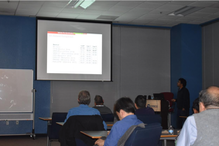
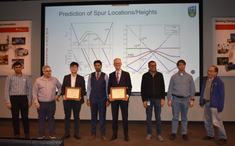
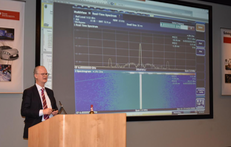
Left photo: Lecture by Dr. Ratnesh Kumar on "Vehicle Re-identification for Smart Cities: A New Baseline Using Triplet Embedding” on January 31st, 2019; Middle photo: IEEE Circuits and Systems Society Lecture Event with Prof. Teerachot Siriburanon and Prof. Michael Peter Kennedy (FIEEE). From left to right Mojtaba Sharifzadeh (Chair SSCS), Jonathan David (CASS Advisor), Prof. Teerachot Siriburanon (UCD), Imran Bashir (CASS Chair), Prof. Michael Peter Kennedy (UCD), Amit Jha (CASS Vice Chair), Robert S. Ogg (CASS Advisor), George Chen (CASS Secretary); Right photo: Prof. Michael Peter Kennedy (FIEEE) during lecture.
The second lecture was given by Prof. Michael Peter Kennedy (FIEEE) who is a Professor of Microelectronic Engineering at University College Dublin and the President of the Royal Irish Academy (RIA). Prof. Kennedy started the discussion with new insights into underlying mechanisms for excess noise and spur generation in Fractional-N frequency synthesizers and proposed a strategy for addressing those underlying causes. The key focus of the lecture was demonstrating the effectiveness of the use of a Successive Re-quantizer to drive the multi-modulus divider in the PLL feedback path. The performance in terms of fractional spurs was compared to a conventional MASH111 approach. The 3 hour event attracted 43 attendees that included IC designers, academics, and students from local industry and schools. The lecture was followed by extensive Q&A session. Prof. Kennedy engaged the audience with few brain twisters and gave away prizes for the winners. Overall, the lecture was applauded by the audience.
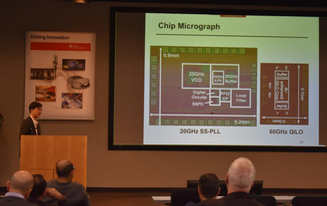
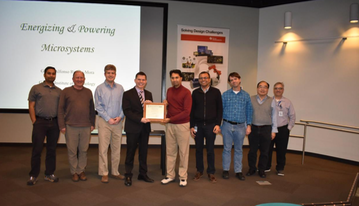
Left photo: Prof. Teerachot Siriburanon during lecture; Right photo: IEEE Circuits and Systems Society Distinguished Lecturer Event with Dr. Gabriel A. Rincón-Mora. From left to right Susheel Brahme (PELS), Michael Seeman (PELS Chair), Dr. Gabriel A. Rincón-Mora (Georgia Tech), Imran Bashir (CASS Chair), Amit Jha (CASS Vice Chair), Robert S. Ogg (CASS Advisor), George Chen (CASS Secretary), Jonathan David (CASS Advisor).
The next event was held on February 28th. This was a join event with SSCS and Power Electronics Society (PELS) local chapters while the Distinguished Lecturer was Dr. Gabriel A. Rincón-Mora from Georgia Tech. The lecture titled "Energizing and Powering Microsystems" was held at the Main Auditorium of Texas Instruments Inc. site in Santa Clara. In his lecture, Dr. Rincón-Mora emphasized the need to monitor and manage power consumption in networked wireless micro-sensors for small and large-scale applications for space, military, medical, agricultural, and consumer markets while being conscious of the cost and energy associated with various power management architectures. Ultra-small systems cannot store sufficient energy to sustain operations for long and replacing batteries of hundreds of networked nodes is impractical. This constraint is the driving force behind Dr. Rincón-Mora’s research at Georgia Tech where his team is engaged in identifying viable energy sources for the aforementioned systems. Through detailed illustrations and measured silicon data, Dr. Rincón-Mora outlined various strategies for drawing energy from elusive ambient sources to power tiny wireless sensors. The total attendance was 36.
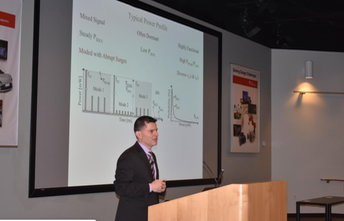
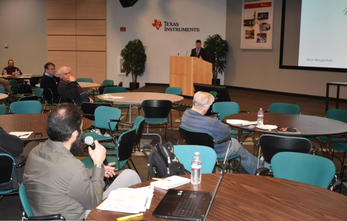
Left photo: Dr. Gabriel A. Rincón-Mora during lecture; Right photo: Dr. Gabriel A. Rincón-Mora during Q&A Session.
The recording of our previous lectures is available for public viewing on IEEE TV. Last year’s lecture from Dr. Mihai Banu has received 342 hits and a 5-star rating. In addition, Dr. Temes’s and Dr. Hans Klein’s lecture has received 229 hits and 107 hits respectively. Dr. Kumar’s lecture is on-line now while the two lectures on PLLs will be posted soon.
Here is a brief outline of our future events. On April 25th, Dr. Alyssa Apsel (CASS DL) from Cornell University will be giving a lecture on “Flexible Radios and Flexible Networks.” Also, Dr. Nageen Himayat from Intel Corporation is scheduled to talk on the topic of “Enabling Wireless Autonomous Systems” sometime in April this year. Planning for more events is underway. We hope to broadcast our future events live on Zoom conference when possible and enable participation from around the world. Please visit our website @ http://sites.ieee.org/scv-cas and join the email list to receive notification of future events and instructions on joining remotely through Zoom. Please visit our Facebook page using the search string “IEEE SCV CAS.” If you have any feedback or suggestions, please email us: ieee.scv.cas@gmail.com..
Imran Bashir, Santa Clara Valley Chapter
____________________________________
Technical Talk on RPW Technology
On 12th March, 2019, a technical talk was given by the senior researcher of Hitachi Ltd. at Faculty Engineering, University Putra Malaysia, Selangor. Dr Ken Takei gave a talk on 'An Introduction to Rotating Polarization Wave (RPW) system’, a new radio technolgy that deterministically uses reflection waves to achieve reliable non line-of-sight communication.
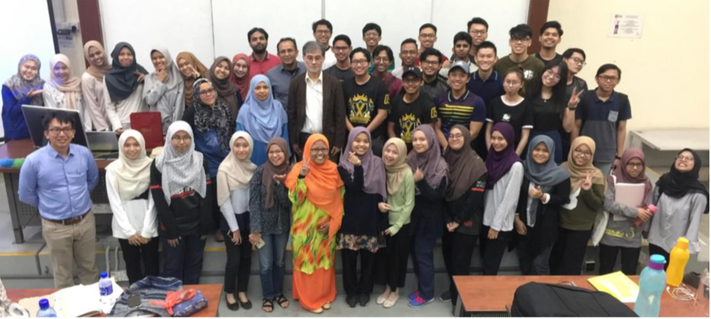
Around 40 participants of the engineering, science and technology background attended the talk. Following the talk is a networking session to promote deeper communication between the attendees with the speaker. The program was co-organized by IEEE CASS Malaysia chapter, UPM’s Computer and Embedded Systems Lab and the UPM’s System-on-Chip Research Center.
Fakhrul Zaman Rokhani, Malaysia Chapter (email: fzr@upm.edu.my)
____________________________________
IoT Camp for Kids — IEEE CASS Malaysia Chapter Works with University to Educate Children
Too early to teach children IoT? Members of IEEE CASS Malaysia chapter didn't think so. They managed to gather around 24 children aged 9 to 15 years old to spend their school break learning Internet of Things. The interactive one-day camp explored why it is important for children to be encouraged in the STEM fields and how STEM could empower innovation and creativity at the early stage. The participants were given assignments with hands-on mentorship on super easy graphical programming using Arduino Uno and basic electronics before they built their first IoT device.
“My youngest son Bryan was so inspired that he has started learning to create his own IoT projects. He said he learnt a lot from the IoT Camp. Special thanks for inspiring and motivating him...” - Ronnie Ng
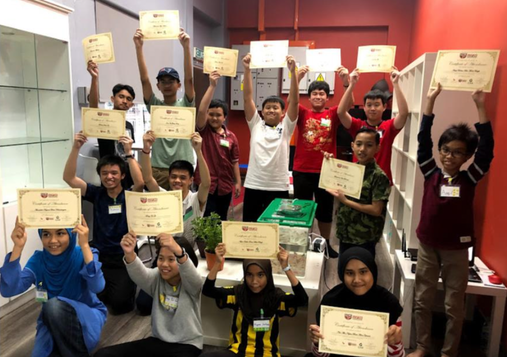
Left photo: Children aged 9 to 15 years old spent their school break in university’s lab to learn Internet of Things.
The camp was held at the Computer and Embedded System Laboratory of University Putra Malaysia (UPM) for two days on 27th & 28th of March. The session included the practical way of utilizing IoT in their daily life such as how IoT being used for smart home and smart farming. The program was organized by IEEE CASS Malaysia chapter with UPM’s Computer and Embedded Systems Lab; and the UPM’s Smart Farming Technology Research Center and System-on-Chip Research Center together with CFP Venture Consortium.
Samsuzana Abd Aziz, Malaysia Chapter (email: samsuzana@upm.edu.my)